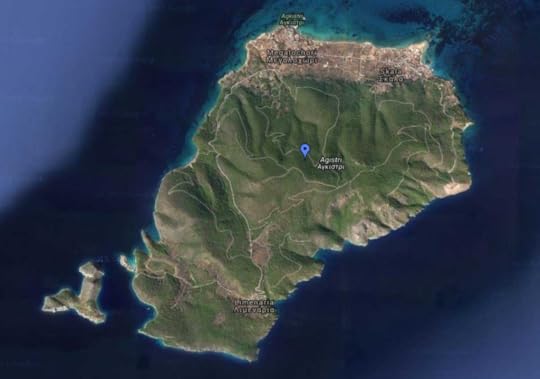Itháki, Agistri, Samos
Ιθάκη, βορειανατολικά πάνω. Η βόρεια Ιθάκη είναι μια καμήλα που ξεκουράζεται. Η νότια Ιθάκη είναι ένας κουρασμένος νομάδας που κρατά την ουρά της καμήλας. Θέλει να συνεχίσει να ταξιδεύει, αλλά η καμήλα προσπαθεί ήσυχα να τον πείσει να επιβραδύνει και να χαλαρώσει. Όλα στην ώρα τους. Υπομονή.
— Radju Rokku, Book ε, Capítulo Siete

An energetic vowel, a singing double consonant. Almost, almost the shorthand Greek word for freedom. Bella, bell-issima. Let’s call her Cleopatra instead, even though she’s from Corsica. She has the hair, the eyes, the lips. She weaves guitar straps near the beach. Conversation flows like island wine. The poet listens, and tries not to look too long at her deep olive skin. Antonio! Keep your ears open, and your heart locked. Books. Music. A little geography. Language? Eh. A singing syllable. A vowel missing. Freedom silent, on a different island. On the final night, the weaver and the poet step back. Neither are free to fall. A guitar weeps on the sand. Trapped by freedom, trapped by silence. Time to take the boat, back toward the unspoken syllables of solitude.
— Radju Rokku, Book ζ, Κεφάλαιο Δεύτερο

Samos. A tortoise with two mountains on her back, competing for height, weighing her down. She shuffles slowly towards Ephesos, never to arrive. No hare will catch her either. She faces east, and only looks west at sunset. Towards a solitary camel, at the other extreme of Greece, whose hump is too large to slip under her carapace once again. Un amore impossibile. Not even Pythagoras can help. Unless, maybe, the camel remembers how to fast.
— Radju Rokku, Book ζ, Κεφάλαιο Τρίτο



